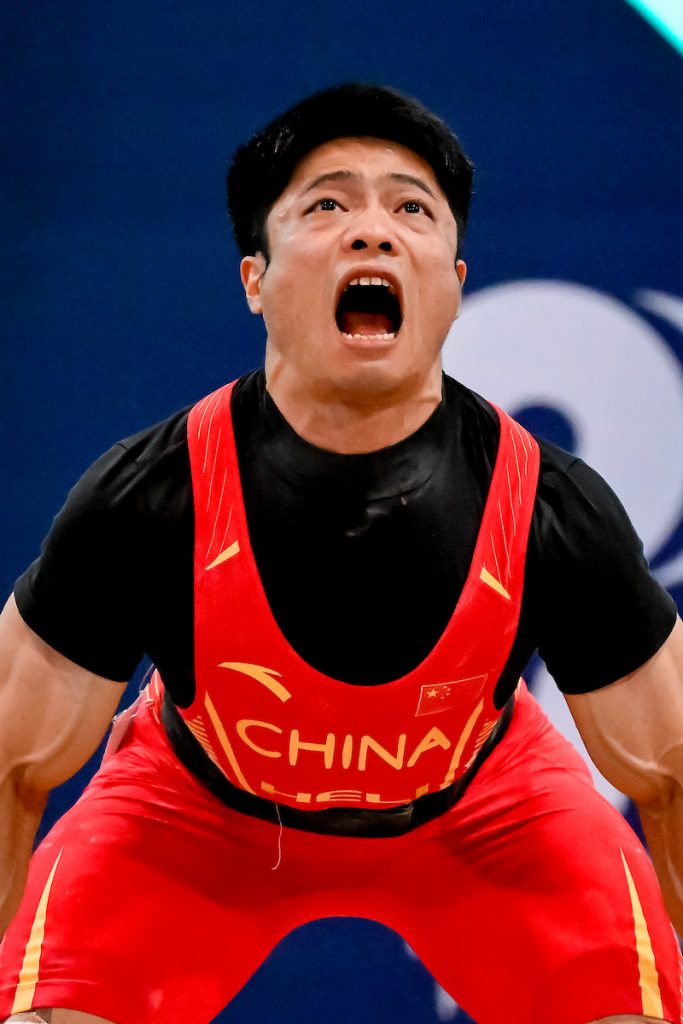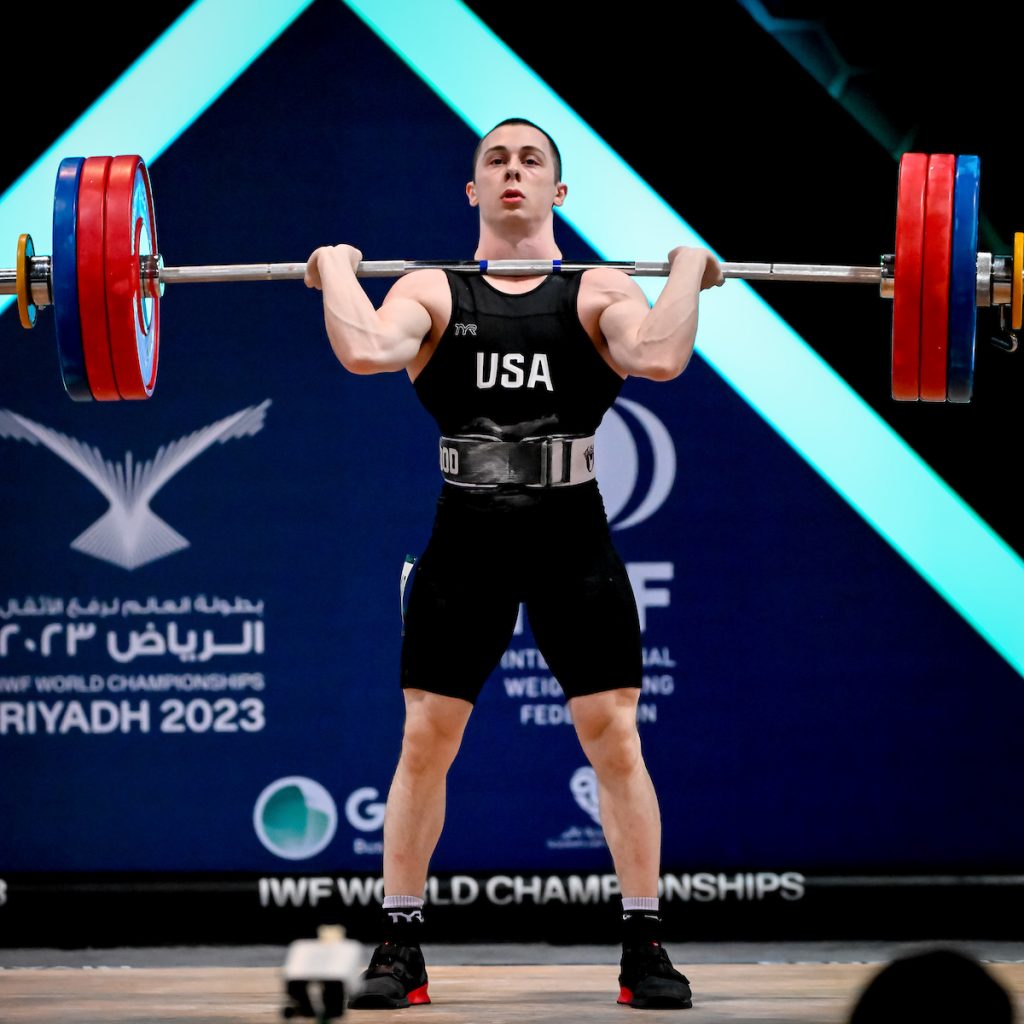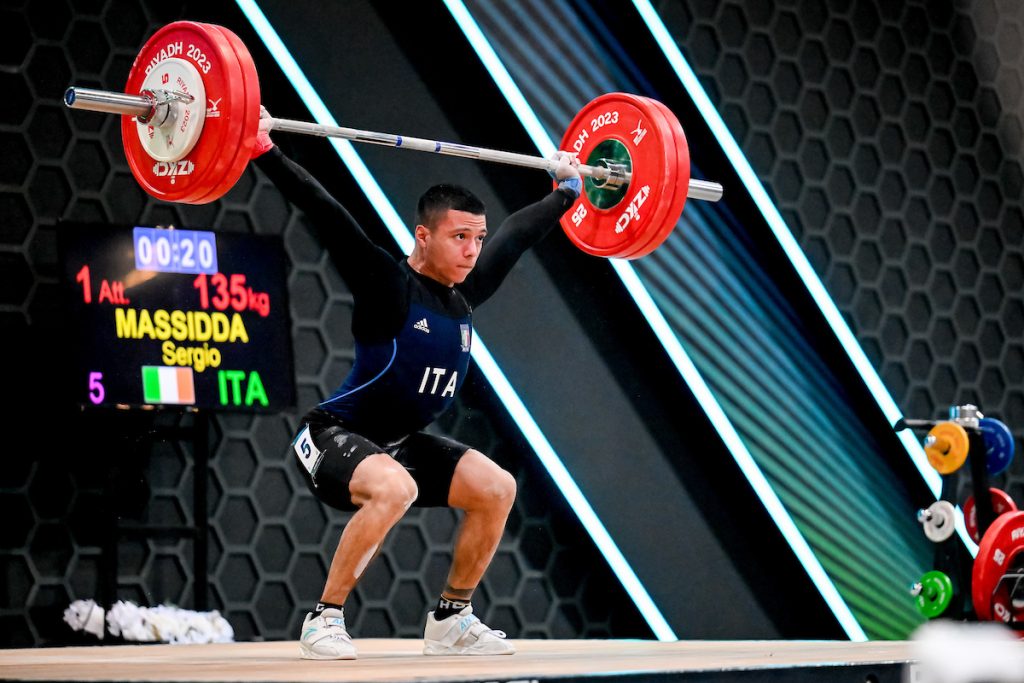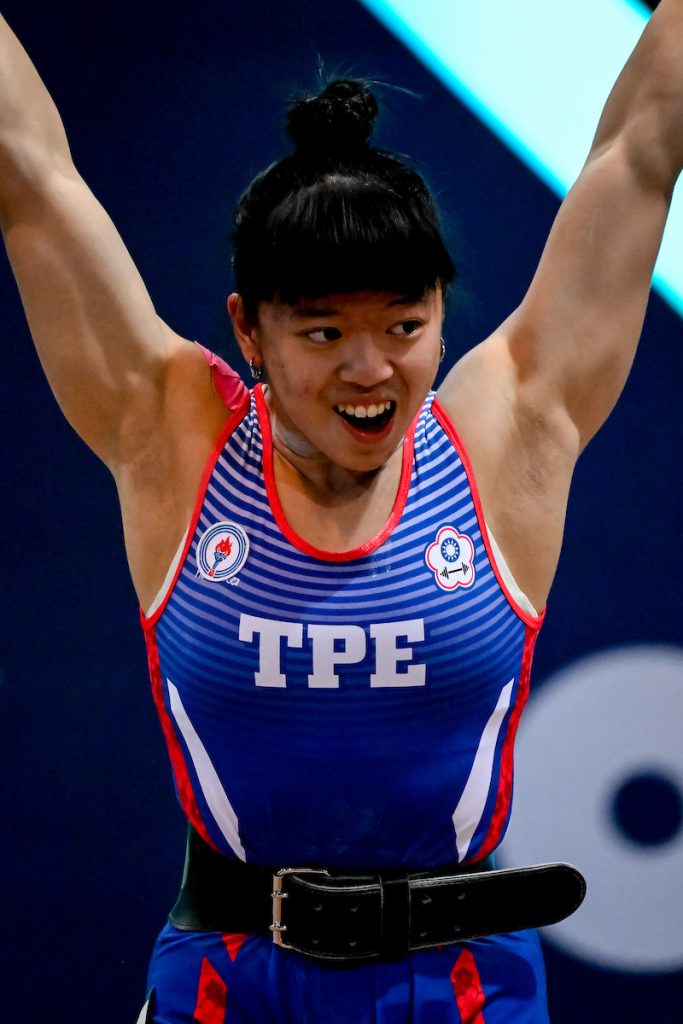Riyadh, Day 3: Glory for China, Italy and USA on day of drama and red lights
The Olympic champion Li Fabin claimed his third world title, Sergio Massidda hit a career high for Italy and the United States had its first male gold medallist in decades on day three of the IWF World Championships in Riyadh.
There was a sea of red lights throughout the 61kg A and B sessions. Even Li was caught up in it as he missed an attempt at a snatch world record and failed with two of his clean and jerks.

Li Fabin (CHN)
He posted 141-167-308 to register his lowest total in a major competition since 2019, finishing 6kg ahead of Massidda on 137-165-302. Li’s team-mate Ding Hongjie was third from the B Group despite making only two good lifts for 135-166-301.
The American teenager Hampton Morris was one of six athletes who failed to make a total but he compensated for three snatch failures by beating the Olympic champion in clean and jerk with a junior world record of 168kg.
The C Group athlete Aniq Kasdan from Malaysia won clean and jerk bronze with 166kg and finished ninth on total. The snatch medallists were Li on 141kg, Massidda on 137kg and Shota Mishvelidze from Georgia, who totalled 297kg, third on 136kg.

Hampton Morris (USA)
Morris became the first male lifter from the United States to win a World Championships gold medal since Mario Martinez in 1984, when the Los Angeles Olympic Games doubled up as the World Championships.
Super-heavyweight Martinez, whose coach Jim Schmitz was in the audience in Riyadh, won the snatch before finishing second on total to the Australian Dean Lukin.
The top 11 places in the 61kg field of 43 included one from the D Group, one from C and three from B because so many of the leading contenders underperformed.
Massidda made four from six in becoming the first European to hit the 300kg mark in this weight category, moving up to second place in the simplified ranking list for Paris 2024.
“This is the high point of my career, my best moment but I can feel there is more to come,” he said.
He went up 2kg from one lift to the next in both snatch and clean and jerk, while others made larger and mostly unsuccessful leaps.

Sergio Massidda (ITA)
Massidda was not watching while others kept failing but said of his strategy, “I tried to go up with the kilos I know, weights I am comfortable with in training.
“The 300 is just the beginning, there will be more, maybe in Qatar or Turkey,” he said, looking ahead to the next qualifiers in December and February.
Massidda, 21, said the atmosphere in Italy’s team was very good and that he and everybody else had prepared well for these Championships.
“But there was a lot of blood!” he said, holding out his callused, gnarled hands. “I can say that for Paris I put Li in the crosshairs.”
Sebastiano Corbu, Italy’s technical director, said, “Sergio is an athlete who manages to maintain coolness and lucidity even in conditions of great tension. Also this time he proved to be an athlete of the highest level.”
Finally, Antonio Urso, President of FIPE, considered, “The 61 kg is one of the most complicated categories of the men’s world championship, an important specific weight. Sergio won two very important medals that fill us with pride and improve his Olympic ranking.”
China now holds the top three places in the long-list Olympic rankings at 61kg, Li, Chen Lijun – who like the fourth-placed Indonesian Eko Yuli Irawan lifts here at 67kg – and Ding. He Yueji on 296kg makes it four in the top 10 for China.
Ten men posted original A Group entry totals of 300kg or more, nine of whom had never been beyond the 290s in their life at this weight. Li and Massidda were the only ones who achieved the feat in the A Group.
The Malaysian D Group lifter Aznil Bidin outperformed five in the A Group with a total of 290kg, only to be outdone by his 21-year-old team-mate Aniq, who made 291kg in the C Group.
“Unfortunately, only one weightlifter per nation is allowed to compete in each weight category at the Olympics so they will have to compete against each other,” the Malaysian Federation secretary Wan Muhammad Hafiz had said before the Championships.
The same applies to China, Indonesia, Thailand, Vietnam, Bulgaria, Georgia and Turkey, who all have at least two with a realistic chance of qualifying.
A high number of no-lifts in the A Group had been predicted a couple of hours before it happened by Simon Brandhuber from Germany, who posted a four-from-six 133-154-287 in the B Group for 13th place overall.
“I thought my entry total would put me in the A Group here but perhaps the high number at 300 has worked to my advantage,” he said.
“If they go high with their entry they will have to start high, and we might see a lot of red lights in the A Group like we had here in the B Group.
“I had hoped for 290-292 but I’m happy with 287. I feel comfortable at this weight and I know there are more kilos in me.”
Brandhuber had a better experience in Riyadh than in Bogotá, Colombia at last year’s World Championships.
He had a fever five days before the Championships and tested positive for Covid. When his health improved and he was keen to lift but had to lose nearly a kilo.
“I couldn’t go into the sauna with other athletes because of my Covid test so I couldn’t cut the weight and had to withdraw.”
Ivan Dimov from Bulgaria moved up the rankings by improving his best qualifying total by 16kg to 293kg, while Arley Calderon from Cuba was 5kg better on 291kg.

Chen Guan-Ling (TPE)
There were plenty of red lights in the other medal event of the day, the women’s 55kg, as well as three B Group lifters in the top 10. Four athletes from a field of 30 failed to make a total.
Chen Guan-Ling from Chinese Taipei had a sweep of golds on 91-112-203, and all three silvers went to Rohelys Galvis from Colombia on 90-11-201.
Irene Borrego from Mexico was third in snatch and total on 89-110-199, and the clean and jerk bronze was won by the Colombian Rosalba Morales on 110kg.
Jenly Wini from the Solomon Islands, more than double Chen’s age at 40, had an impressive 84-100-184 for 13th place from the C Group. She will be hoping for similar good form in November when Solomon Islands hosts the Pacific Games, which doubles up as the Oceania Championships and is an Olympic qualifier.
Brian Oliver, Inside the Games
Photos by Giorgio Scala/Deepbluemedia










